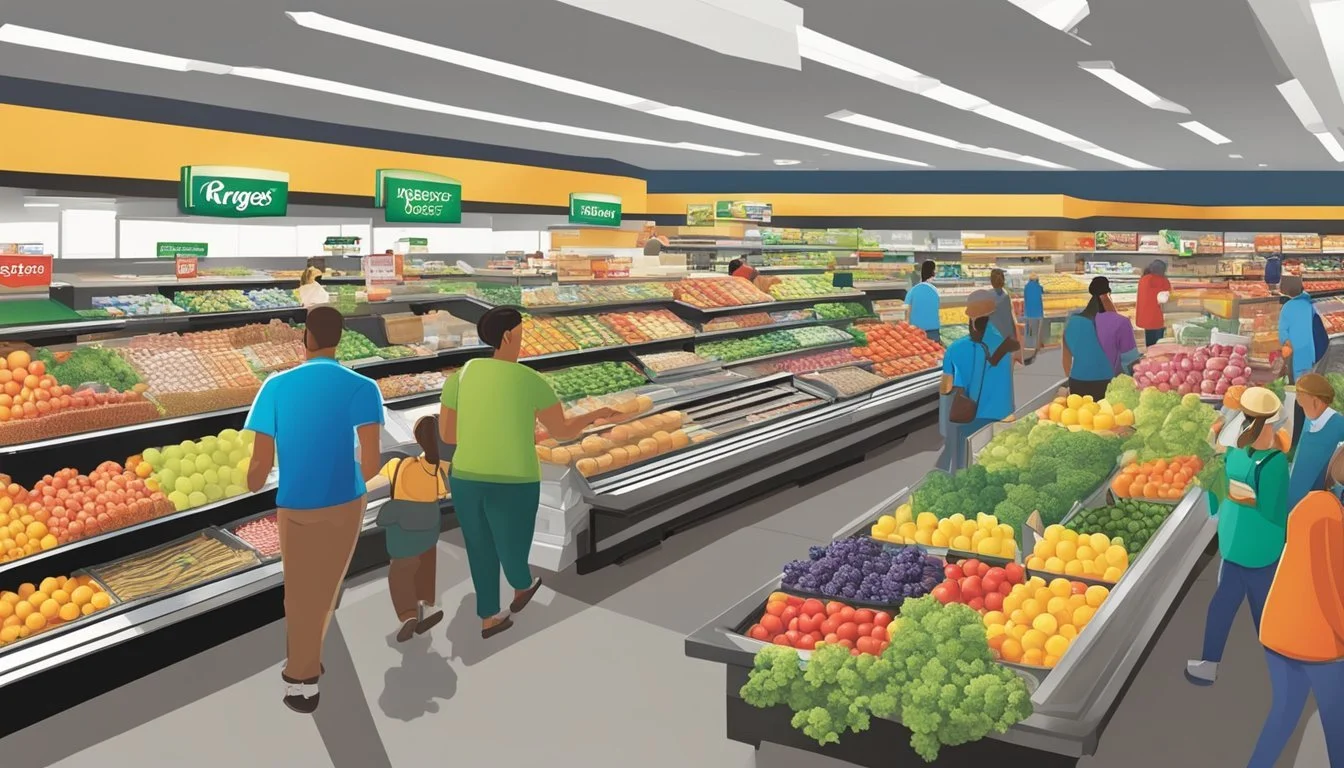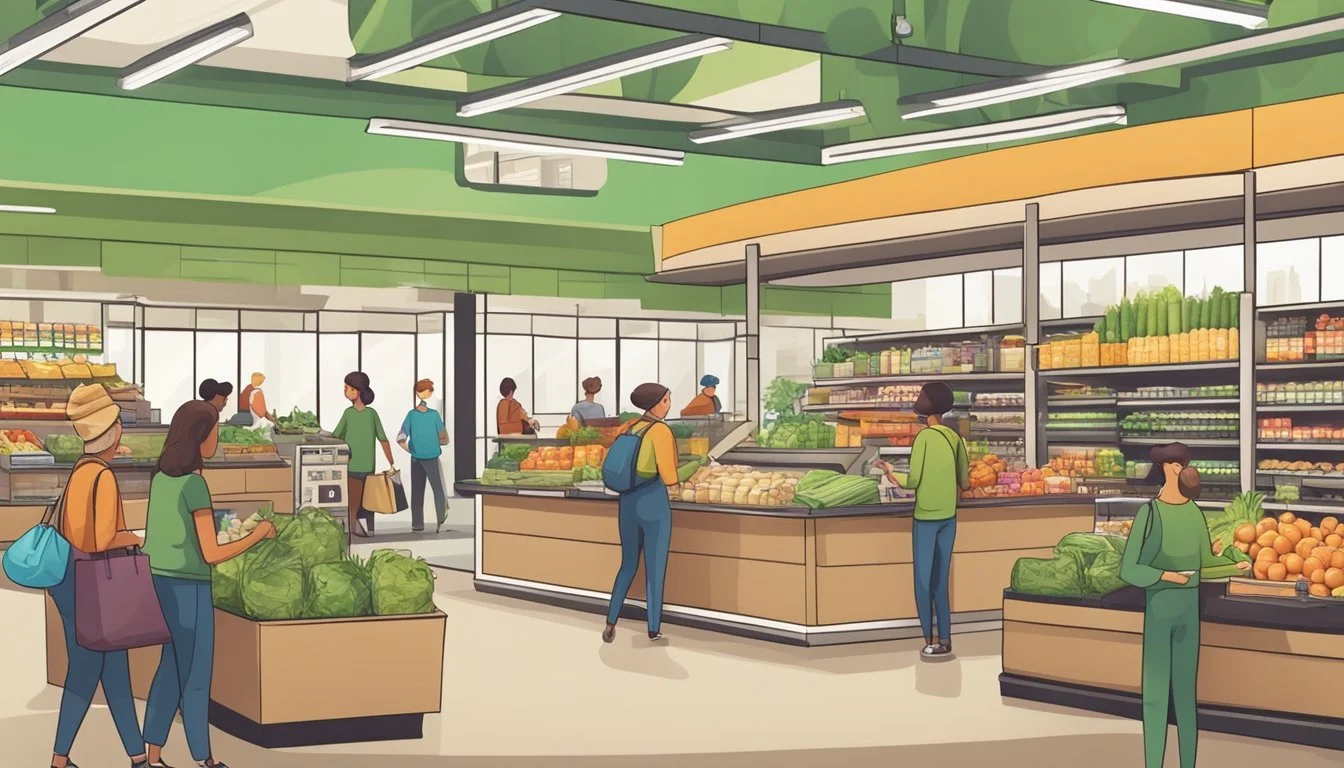Ingles Markets vs Kroger
A Comprehensive Comparison of Price, Quality, and Selection
Ingles Markets and Kroger are two prominent grocery chains serving millions of customers across the United States. Both offer a wide range of products, competitive pricing, and convenient locations. Shoppers often compare these stores when deciding where to purchase their groceries.
Kroger typically offers lower overall prices compared to Ingles Markets, especially on organic produce. Kroger's larger scale and distribution network allow for more competitive pricing on many items. However, Ingles Markets may have advantages in certain areas, such as local product offerings and customer service in some locations.
The choice between Ingles Markets and Kroger often comes down to individual preferences and priorities. Factors like store location, product selection, loyalty programs, and shopping experience all play a role in determining which grocery store better meets a customer's needs. Comparing specific product prices and evaluating the overall shopping experience at local branches can help consumers make an informed decision.
Company Profiles
Ingles Markets and Kroger are two prominent grocery chains in the United States, each with a rich history and distinct market presence. Both companies have grown from humble beginnings to become major players in the supermarket industry.
History of Ingles Markets
Ingles Markets was founded in 1963 by Robert Ingle in Asheville, North Carolina. The company started with a single store and expanded steadily throughout the southeastern United States. Ingles focused on providing fresh, high-quality products at competitive prices.
By the 1980s, Ingles had grown to over 100 stores. The company went public in 1987, trading on the NASDAQ. Ingles Markets is known for its in-store bakeries, delis, and pharmacies. It operates approximately 200 supermarkets across six southeastern states.
History of Kroger
Kroger's roots date back to 1883 when Barney Kroger invested his life savings to open a grocery store in Cincinnati, Ohio. His business philosophy was simple: "Be particular. Never sell anything you would not want yourself."
Kroger expanded rapidly through both organic growth and acquisitions. By the 1920s, the company had stores across the Midwest. Kroger pioneered many industry firsts, including in-store bakeries and self-service shopping.
Today, Kroger is one of the largest retailers in the world. It operates nearly 2,800 stores across 35 states under various banners. The company has diversified into fuel centers, jewelry stores, and convenience stores.
Store Locations and Accessibility
Ingles Markets and Kroger have distinct geographical footprints, impacting their accessibility for shoppers. Each chain's store locations reflect their regional focus and expansion strategies.
Ingles Markets Locations
Ingles Markets operates primarily in the southeastern United States. The chain has over 200 stores spread across six states: North Carolina, South Carolina, Georgia, Tennessee, Alabama, and Virginia. North Carolina hosts the highest concentration of Ingles stores.
Ingles typically focuses on suburban and rural areas, often serving as a community hub in smaller towns. Many locations feature Ingles Gas Express stations, adding convenience for customers.
The company's distribution center in Black Mountain, North Carolina, supports efficient restocking and product availability across its network.
Kroger Locations
Kroger boasts a much larger national presence with approximately 2,800 stores in 35 states. The company operates under various banners, including Kroger, Ralphs, Dillons, Smith's, and Fred Meyer.
Kroger stores are found in urban centers, suburbs, and rural areas. The chain has a strong presence in the Midwest, South, and parts of the West Coast.
Many Kroger locations offer fuel centers and pharmacy services. The company's extensive network allows for greater accessibility in diverse geographic regions.
Kroger's distribution system includes 17 automated warehouses, enabling efficient supply chain management across its widespread locations.
Pricing and Value
Ingles Markets and Kroger offer different pricing strategies and value propositions for shoppers. Both chains aim to provide competitive prices and savings opportunities to attract budget-conscious customers.
Comparison of Everyday Prices
Kroger generally has lower everyday prices compared to Ingles Markets. A comparison of common grocery items reveals Kroger's prices are often 5-10% cheaper. For produce, Kroger's prices averaged $16.02 for a typical selection, while Ingles totaled $19.74 - a difference of $3.72.
Kroger's larger scale and buying power likely contribute to its ability to offer lower base prices. However, price differences can vary by product category and specific items.
Regional variations may also impact pricing. Local competition and supply chain factors influence each store's pricing in different markets.
Deals and Discounts
Both chains offer weekly sales and promotional discounts to attract shoppers. Kroger typically features more sale items and deeper discounts. Their digital coupons are plentiful and easy to use.
Ingles runs fewer but sometimes more targeted promotions. Their "10 for $10" deals on select items can provide good value.
Kroger's "Buy 5 Save $5" promotions on participating items are popular with shoppers looking to stock up and save. Ingles occasionally offers similar bulk purchase discounts.
Seasonal sales events like holiday promotions tend to be more extensive at Kroger stores.
Saving Programs and Rewards
Kroger's loyalty program offers more robust savings opportunities. Their Fuel Points program allows customers to earn discounts on gas purchases. Digital coupons load directly to loyalty cards for easy redemption.
Ingles' Advantage Savings and Rewards Card provides discounts on select items. However, their program lacks some of the additional perks found in Kroger's offering.
Kroger's app makes it simple to track rewards and clip digital coupons. Ingles' digital tools are functional but less comprehensive.
Both stores offer store-brand alternatives to name brands at lower prices. Kroger's wider selection of private label products provides more budget-friendly options across categories.
Product Range and Quality
Ingles Markets and Kroger offer diverse product ranges with varying quality across key grocery categories. Both chains strive to meet customer needs through their selections of fresh produce, meats, store brands, and health-focused options.
Produce Selection
Ingles Markets provides a solid array of fresh fruits and vegetables, focusing on locally sourced items when possible. Their produce departments typically feature seasonal offerings and regional specialties. Kroger, with its larger footprint, offers an extensive produce selection that often includes exotic and specialty items alongside traditional choices. Kroger's produce sections tend to be larger, with more variety in organic and conventional options. Both stores maintain quality standards, but Kroger's scale allows for more competitive pricing on many items.
Meat and Deli Quality
The meat and deli departments at both chains offer a range of options to suit different preferences and budgets. Ingles Markets prides itself on its butcher services and often features locally sourced meats. Their delis offer made-to-order sandwiches and prepared foods. Kroger's meat departments are typically larger, with a wider selection of cuts and pre-packaged options. Kroger's delis often include more extensive hot food bars and ready-to-eat meals. Quality can vary by location, but both chains maintain food safety standards and offer premium selections.
Store Brand Products
Ingles Markets' Laura Lynn brand covers a wide range of products across various categories. These items often provide good value while maintaining quality. Kroger's store brands, including Kroger, Private Selection, and Simple Truth, span an even broader range of products. Kroger's larger scale allows for more variety and often competitive pricing in their store brand offerings. Both chains use their private labels to offer alternatives to national brands, but Kroger's selection is typically more extensive.
Organic and Health Options
Both Ingles Markets and Kroger have expanded their organic and health-focused offerings in recent years. Ingles provides a selection of organic produce and natural products throughout their stores. Kroger, however, has made significant investments in this area. Their Simple Truth organic line covers a wide range of products. Kroger stores often feature larger natural foods sections with more variety in specialty diets and alternative products. While both chains cater to health-conscious consumers, Kroger typically offers a more comprehensive selection of organic and health-oriented options.
Customer Experience
Ingles Markets and Kroger differ significantly in their customer experience offerings. Both chains prioritize satisfying shoppers, but their approaches vary in key areas like store design, service quality, and checkout efficiency.
Store Layout and Design
Kroger stores typically feature a more modern and spacious layout. Wide aisles and clear signage make navigation easier for customers. Many Kroger locations have undergone recent renovations, incorporating brighter lighting and updated decor.
Ingles Markets often have a more traditional supermarket feel. Their stores tend to be smaller than Kroger's, which can make them feel cramped during busy periods. However, Ingles emphasizes a local, community-oriented atmosphere in their design choices.
Both chains organize products logically, with similar items grouped together. Kroger's larger footprint allows for more extensive product selections in most departments.
Customer Service Comparison
Kroger has invested heavily in customer service training programs. Their employees are generally knowledgeable about product locations and store policies. The chain also offers a robust customer loyalty program with personalized discounts and fuel points.
Ingles Markets prides itself on a more personal touch. Their smaller size often translates to more familiar relationships between staff and regular customers. Employees at Ingles tend to have longer tenure, potentially leading to better product knowledge.
Both chains score similarly in customer satisfaction surveys, with slight variations depending on specific store locations and management.
Checkout Efficiency
Kroger has embraced technology to improve checkout speed. Many stores offer self-checkout options and mobile payment systems. The chain has also implemented "Scan, Bag, Go" technology in some locations, allowing customers to scan items as they shop.
Ingles Markets typically relies more on traditional checkout methods. While they do offer self-checkout in some stores, the availability is less widespread than at Kroger. This can lead to longer wait times during peak shopping hours.
Both chains strive to maintain adequate staffing at registers, but Kroger's technological edge often results in faster overall checkout experiences. Customer surveys indicate higher satisfaction with Kroger's checkout efficiency compared to Ingles Markets.
Brand and Community Presence
Kroger and Ingles Markets have distinct approaches to brand building and community engagement. Their marketing strategies and local involvement efforts shape public perception and customer loyalty.
Marketing and Brand Image
Kroger boasts a strong national brand presence, recognized across the United States. Its marketing campaigns often focus on value, quality, and convenience. The company's loyalty program and digital coupons appeal to budget-conscious shoppers.
Ingles Markets maintains a more regional brand identity, primarily in the Southeast. Their marketing emphasizes fresh produce and local products. Ingles' smaller scale allows for a more personalized shopping experience, which resonates with many customers in their operating areas.
Community Involvement and Initiatives
Kroger's community efforts include nationwide programs like Zero Hunger | Zero Waste, aiming to eliminate food waste and hunger by 2025. The company also supports local food banks and education initiatives across its operating regions.
Ingles Markets focuses on grassroots community involvement. They sponsor local events, school programs, and sports teams in the areas they serve. This approach fosters strong connections with customers and reinforces their image as a neighborhood grocer.
Both companies prioritize giving back, but Kroger's initiatives tend to have broader reach due to its larger size and resources. Ingles' community work, while more localized, often creates deeper ties in specific communities.
Online and In-Store Technologies
Kroger and Ingles Markets have embraced digital innovations to enhance the shopping experience. Both chains offer e-commerce platforms and mobile apps with digital coupons, though their specific features and capabilities differ.
E-Commerce Platforms
Kroger's online shopping platform is robust and user-friendly. It allows customers to browse products, create shopping lists, and schedule pickup or delivery. Kroger has invested heavily in its e-commerce capabilities, partnering with Ocado to build automated fulfillment centers.
Ingles Markets also offers online shopping, but on a smaller scale. Their platform provides basic functionality for ordering groceries for pickup. However, it lacks some of the advanced features found in Kroger's system.
Both chains face competition from Amazon, Walmart, and Target in the e-commerce space. These retailers have set high standards for online grocery shopping experiences.
Mobile Apps and Digital Coupons
Kroger's mobile app is feature-rich, offering digital coupons, personalized deals, and shopping list management. It integrates seamlessly with their loyalty program, allowing customers to track fuel points and redeem rewards.
Ingles Markets' app is more basic but still functional. It provides digital coupons and allows users to view weekly ads. The app helps customers save money but doesn't offer the same level of personalization as Kroger's.
Both apps aim to streamline the grocery shopping process and provide savings opportunities. They compete with similar offerings from other supermarkets and big-box retailers like Walmart and Target.
Sustainability and Social Responsibility
Ingles Markets and Kroger have made strides in sustainability and corporate responsibility. Both companies have implemented environmental practices and ethical sourcing policies to reduce their impact and support communities.
Environmental Practices
Kroger has set ambitious environmental goals. The company aims to reduce its carbon footprint and increase energy efficiency across its operations. Kroger has invested in renewable energy sources and implemented waste reduction programs in its stores.
Ingles Markets has also taken steps to improve sustainability. The company has installed energy-efficient lighting and refrigeration systems in many of its locations. Ingles has implemented recycling programs and works to reduce food waste in its stores.
Both retailers have made efforts to reduce plastic use. Kroger has committed to phasing out single-use plastic bags, while Ingles offers reusable bag options to customers.
Ethical Sourcing Policies
Kroger has developed a comprehensive ethical sourcing program. The company works with suppliers to ensure fair labor practices and responsible production methods. Kroger has committed to sourcing 100% sustainable wild-caught seafood by 2023.
Ingles Markets emphasizes local sourcing when possible. This approach supports regional farmers and reduces transportation emissions. The company also offers a selection of organic and fair trade products in its stores.
Both retailers have increased their offerings of plant-based and environmentally friendly products. This shift responds to growing consumer demand for sustainable options.
Kroger and Ingles have established food donation programs to support local communities and reduce food waste. These initiatives help address food insecurity while minimizing environmental impact.
Comparison with Other Retailers
Ingles Markets and Kroger face stiff competition from other major retailers in the grocery industry. Their pricing, product selection, and overall shopping experience are often measured against larger chains, specialty stores, and discount grocers.
How They Stack Up Against Walmart and Target
Walmart typically offers lower prices than both Ingles Markets and Kroger. A price comparison found Walmart's groceries to be about 4% cheaper than Kroger's. However, Kroger tends to have a 3.3% price advantage in the "fresh" category, including proteins, dairy, and vegetables.
Target has expanded its grocery offerings in recent years. While not as comprehensive as Ingles or Kroger, Target often provides competitive pricing on packaged goods and household essentials.
Ingles Markets, being a regional chain, may offer more localized products and personalized service compared to these national retailers.
Competing with Specialty Stores Like Trader Joe's
Trader Joe's has carved out a niche with unique, often private-label products. Ingles and Kroger have responded by expanding their own specialty and organic selections.
Kroger's Simple Truth organic brand competes directly with Trader Joe's offerings. Ingles has also increased its organic and natural food options to attract health-conscious shoppers.
While Trader Joe's may have an edge in trendy, niche items, Ingles and Kroger offer a wider range of mainstream products and national brands.
Comparison with Discount Chains Like Aldi and Dollar General
Aldi consistently ranks as one of the most affordable grocery options. In a price comparison of 41 items, Aldi was 14% cheaper than Walmart and over 20% cheaper than Kroger, even with a store savings card.
Dollar General has been expanding its grocery offerings, particularly in rural areas. Their limited selection focuses on shelf-stable and frozen items at very low prices.
Ingles and Kroger counter these discount chains with wider selections, fresher produce, and full-service departments like bakeries and delis. They also offer more national brands and higher-end products.
Both Ingles and Kroger use loyalty programs and digital coupons to provide competitive pricing for regular shoppers, helping to bridge the price gap with discount chains.
Conclusion
Ingles Markets and Kroger both offer distinct advantages for grocery shoppers. Ingles tends to excel in providing a more personalized, community-focused shopping experience. Their stores often feature local products and cater to regional tastes.
Kroger, as a larger national chain, typically offers more competitive pricing and a wider selection of products. Their size allows them to leverage economies of scale, potentially resulting in better deals for customers.
For produce, Kroger has shown to be more cost-effective. A comparison found Kroger's produce section to be $3.72 cheaper than Ingles for a comparable selection of fruits and vegetables.
Employee satisfaction appears higher at Kroger. The company scores 56/100 for employee perks and benefits, compared to Ingles' 47/100.
Ultimately, the choice between Ingles and Kroger depends on individual priorities. Those valuing local connections and a smaller store format may prefer Ingles. Shoppers seeking lower prices and a broader product range might lean towards Kroger.
Both chains have strengths and weaknesses. Consumers should evaluate their specific needs, budget constraints, and shopping preferences when deciding between these two grocery retailers.







